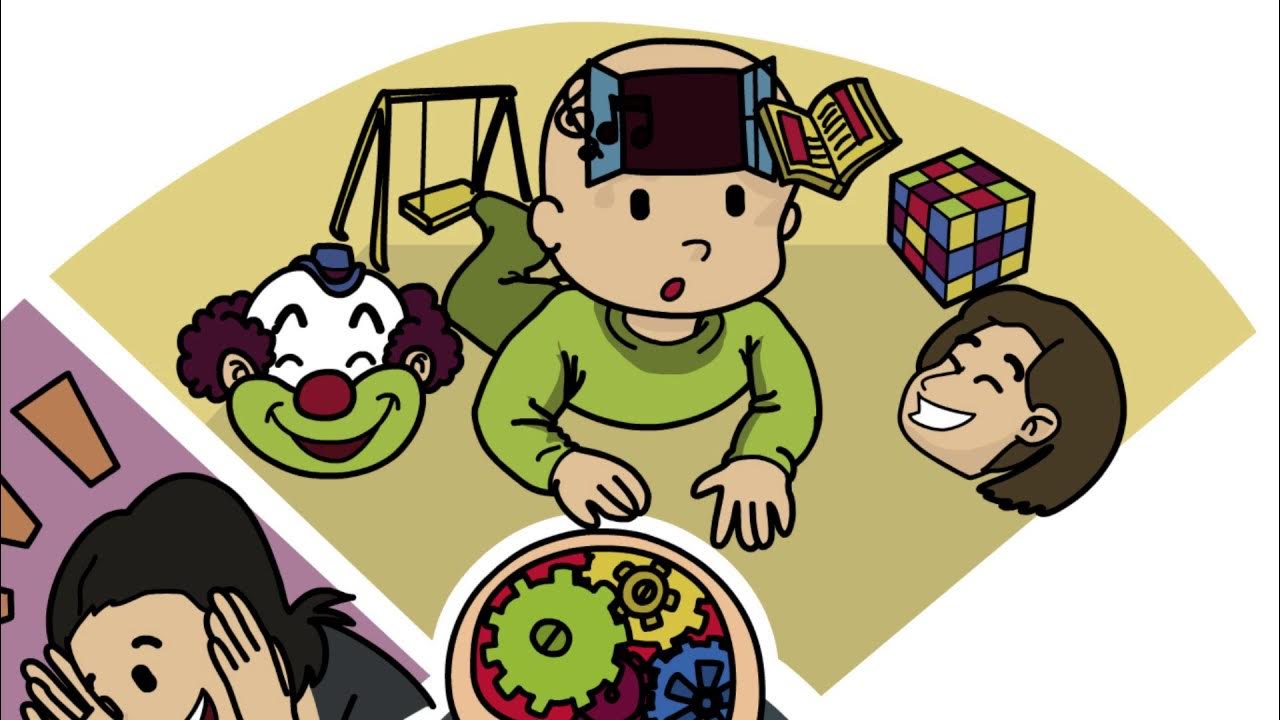Adverse Childhood Experiences (ACEs): Impact on brain, body and behaviour
Summary
TLDRThis script emphasizes the crucial role early childhood experiences play in shaping brain development. It explains how both genetics (nature) and environmental factors (nurture) influence brain functions. Positive stress can help children develop coping skills, while toxic stress from adverse experiences (like abuse or neglect) can disrupt brain areas crucial for learning, emotion regulation, and memory. The script also discusses the impact of epigenetics, showing how early experiences affect gene expression, potentially influencing lifelong health and behavior. Ultimately, it highlights the importance of nurturing relationships and caregiver support in fostering healthy development and preventing negative outcomes.
Takeaways
- 😀 Early childhood experiences are crucial for brain development, with both nature (genes) and nurture (environment) playing key roles.
- 😀 Genes provide the basic framework for brain development, but environmental factors shape how the brain functions by influencing which connections are formed.
- 😀 Brain connections that are frequently used strengthen over time, while those that are not fade away.
- 😀 Healthy, stable, and nurturing relationships in early life support positive brain development and overall well-being.
- 😀 Stress is a normal part of childhood development, but when stress is frequent, chronic, and unmanaged, it becomes toxic, harming brain function.
- 😀 Positive stress, like starting daycare or meeting new people, helps children develop coping skills and confidence.
- 😀 Adverse Childhood Experiences (ACEs) such as abuse, neglect, and exposure to violence lead to toxic stress, which can cause long-term emotional, cognitive, and physical health issues.
- 😀 Chronic activation of the stress response can harm immune system functioning, increase the risk of disease, and negatively impact brain areas responsible for emotions, learning, and impulse control.
- 😀 Epigenetics explains how experiences like stress and relationships affect gene expression, without altering the DNA code itself, influencing future development.
- 😀 Early intervention through positive, supportive relationships and programs for caregivers can prevent many negative outcomes associated with ACEs and promote healthy development.
Q & A
What role do genes play in brain development?
-Genes provide the basic framework for brain development, acting as a blueprint that guides the initial structure of the brain. However, they do not fully design the brain; environmental factors also play a crucial role in shaping brain function.
How do environmental influences impact brain development?
-Environmental influences, such as experiences and interactions, help fine-tune brain development by shaping which brain connections are used. Connections that are used more often grow stronger, while unused connections fade away.
What is the difference between positive and toxic stress?
-Positive stress is normal and manageable, such as starting daycare or meeting new people, which helps children develop coping skills and confidence. Toxic stress, on the other hand, is chronic, frequent, and unmanaged stress that can harm a child's development, especially when there is no supportive caregiver to buffer the stress.
What are Adverse Childhood Experiences (ACEs) and how do they affect development?
-ACEs refer to negative experiences such as abuse, neglect, exposure to violence, parental depression or addiction, and poverty. These experiences can lead to long-term effects on learning, behavior, emotional regulation, and physical health, including increased risk of disease and social problems.
How does the stress response system function in children?
-When children experience stress, their stress system is activated, causing increased alertness, heart rate, and levels of stress hormones like cortisol and adrenaline. This prepares the body for a 'fight or flight' response. After the stressor is over, or with caregiver support, the body returns to a normal state.
What happens when stress is prolonged or unmanaged in children?
-Prolonged and unmanaged stress can lead to constant activation of the stress response system, which, without support from caregivers, can negatively affect the immune system, increase the risk of sickness, and harm brain development, especially in areas responsible for learning, emotional regulation, and memory.
Which areas of the brain are most affected by toxic stress?
-Toxic stress affects several areas of the brain, including the executive center (responsible for problem-solving, attention, and reasoning), the emotional center (involved in processing emotions and impulse control), and the memory and learning center (responsible for memory formation and retrieval).
What is epigenetics and how does it relate to ACEs?
-Epigenetics refers to changes in gene expression that occur without altering the underlying DNA. Experiences like stress, nutrition, and relationships can affect gene expression, influencing brain development, cognition, and physical and mental health. ACEs can lead to epigenetic changes, which may be passed down to future generations.
Can supportive relationships help mitigate the effects of toxic stress?
-Yes, positive, supportive relationships, especially from caregivers, can help buffer the effects of toxic stress. These relationships can play a key role in fostering resilience and promoting healthy brain development, even in the face of early adversity.
What role do caregivers play in a child's brain development?
-Caregivers play a critical role in a child's brain development by engaging in warm, responsive interactions. This includes activities like making eye contact, responding to the child's emotional needs, and sharing experiences like reading and play, which promote healthy emotional, social, and cognitive growth.
Outlines

このセクションは有料ユーザー限定です。 アクセスするには、アップグレードをお願いします。
今すぐアップグレードMindmap

このセクションは有料ユーザー限定です。 アクセスするには、アップグレードをお願いします。
今すぐアップグレードKeywords

このセクションは有料ユーザー限定です。 アクセスするには、アップグレードをお願いします。
今すぐアップグレードHighlights

このセクションは有料ユーザー限定です。 アクセスするには、アップグレードをお願いします。
今すぐアップグレードTranscripts

このセクションは有料ユーザー限定です。 アクセスするには、アップグレードをお願いします。
今すぐアップグレード関連動画をさらに表示
5.0 / 5 (0 votes)






